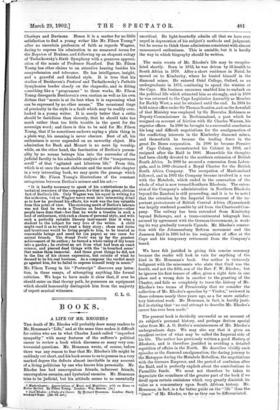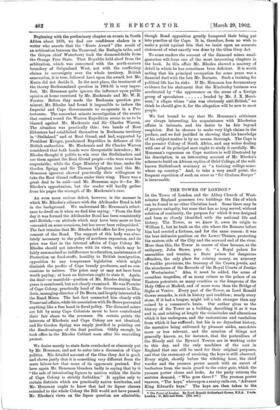BOOKS..
A LIFE OF MR. RHODES•t Tan death of Mr. Rhodes will probably draw many readers to Mr, Hensman'a "Life," andat the same time makes it difficult for critics who are in what Charles Lanth called "imperfect sympathy" with many features of the sufferer's political career to review a book which discusses so many very Con- troversial questions. Mr. Hensman wrote, of course, before there was any reason to fear that Mr. Rhodes's life might be soddenly cut short, and his book seems to us to possess in a very marked degree the, defects almost inevitable in any account of a living _politician by one who knows him personally. Mr. Rhodes has had unscrupulous friends, indiscreet Mends, unscrupulous enemies, and hysterical enemies. Mr. Hensman tries to be -judicial, but -his attitude seems to us essentially irliofropts_ ers_: preiatio_lui of Music and Musician; with as Essay on Berlioz. By n Young. London Win. Beeves. [5o.] t aloe/Modes: a Study of a Career. AT go,waril Renames'. London Black. swims eosa. fl2s. eal. not] - .. -.
uncritical. He light-heartedly admits all that we have ever urged in deprecation of his subject's methods and judgment; but he seems to think these admissions oonsistent with almost unmeasured enthusiasm.' This is amiable, but it is hardly the way in which biography should be written.
The main events of Mr. Rhodes's life may be recapitu- lated shortly. Born in 1853, he was driven by ill-health to South Africa in 1870. After a short residence in Natal, he moved on to Kimberley, where he busied himself in the diathond mines. He entered Oriel College, Oxford, as an undergraduate in 1873, continuing to spend the winters at the Cape. His business successes enabled him to embark on the political life which attracted him so strongly, and in 1880 he was returned to the Cape Legislative Assembly as Member for Barkly West, a seat he retained until the end. In 1884 he held minor office under Sir Thomas Scanlen, and on the downfall of that Ministry was employed by Sir Hercules Robinson as Deputy-Commissioner in Bechuanaland, a post which he resigned on account of friction with Sir Charles Warren, his superior officer. In 1888 he brought to a successful conclusion his long and difficult negotiations for the amalgamation of the conflicting interests in the Kimberley diamond mines, and thenceforth be became the leading force in the great De Beers corporation. In 1890 he became Premier of Cape Colony, reconstructed his Cabinet in 1893, ant resigned after the Raid in 1896. Meanwhile his thoughts had been chiefly devoted to the northern extension of British South Africa. In 1888 he secured a concession from Loben- gula, and in 1889 obtained a Royal Charter for the British South Africa Company. The occupation of Masbonaland followed, and in 1893 the Company became involved in a war with the Matabele, which ended in the annexation of the whole of what is now termed Southern Rhodesia. The exten- sion-of the Company's administration in Northern Rhodesia beyond the Zambesi is still proceeding, and it is to be notel that the retention by the Imperial Government of the im- portant protectorate of British Central Africa (Nyassaland) was largely rendered possible by aid from the Chartered Com- pany. The railway has been extended from Kimberley beyond Bulawayo, and a trans-continental telegraph line, secured by agreement with the German Government, is work- ing its way gradually towards Uganda. Mr. Rhodes's connec- tion with the Johannesburg Reform movement and the Jameson Raid in 1895 led to his resignation of office at the Cape and his temporary retirement from the Company's board.
We have felt justified in giving this concise summary because the reader will look in vain for anything of the kind in Mr. Hensman's book. Our author is virtuously indignant with the miscreants who state that Cecil was the fourth, and not the fifth, son of the Rev. F. W. Rhodes ; but he ignores his first tenure of office, gives a right date in one place and a wrong date in another to the granting of the. Charter, and fails so completely to trace the history of Mr. Rhodes's two terms of Premiership that we consider the- collection of Mr. Rhodes's speeches by " Vindex," reviewed in these columns nearly three years ago, as a far more satisfac- tory historical work. Mr. Hensman, in fact, is hardly justi-_ fled in stating that " no real attempt to describe Mr. Rhodes's career has ever been made."
The present book is decidedly successful as an account of its subject's personal history, and perhaps derives special value from Mr. A. G. Butler's reminiscences of Mr. Rhodes's undergraduate days. We may also say that it gives an excellent review of what may bo called the Imperial side of his life. The author has previously written a good History of Rhodesia, and is therefore justified in avoiding a detailed repetition of affairs in the North. He describes vividly such episodes as the diamond amalgamation, the daring journey to the Matoppos during the Matabele Rebellion, the negotiations with the German Emperor, and the period of confusion after the Raid, and is perfectly explicit about the contributions to Parnellite funds. We must not therefore be taken to depreciate the sonndness of the greater part of the book if we dwell upon certain omissions which very greatly diminish its value as a commentary upon South African history. Mr. Hensman, in. fact, is a far better guide on the " life" than the, if limes" of gr. Rhodes, so far ae they can be differentiated.,
Beginning with the preliminary chapter on events in South Africa about 1870, we find our confidence shaken in a writer who asserts that the " Keats Award" (the result of an arbitration between the Transvaal, the Batlapin tribe, and the Griqua chief Waterboer) took the diamond-fields from the Orange Free State. That Republic held aloof from the arbitration, which was concerned with the north-eastern boundary of Griqualand West, not with the conflicting claims to sovereignty over the whole territory. British annexation, it is true, followed bard upon the award, but Mr. Keate did not decide it. In the next place, the treatment of the thorny Bechuanaland question in 1884-85 is very imper- fect. Mr. Hensman quite ignores the influence upon public opinion at home exercised by Mr. Mackenzie and Mr. W. E. Forster. Before they made the Bechuana question pro- minent, Mr. Rhodes had found it impossible to induce the Imperial and Cape Governments to co-operate in a Pro- tectorate. The somewhat minute investigation of the events that centred round the Warren Expedition seems to us to be biassed against Mr. Mackenzie and Sir Charles Warren.
The situation was practically this : two bands of Boer filibusters had established themselves in Bechuana territory
in " Stellaland" and at Rooi Grond, and bad, supported by President Kruger, proclaimed Republics in defiance of the British authorities. Mr. Mackenzie and Sir Charles Warren considered that both bands were disreputable intruders ; Mr. Rhodes thought it politic to win over the Stellalanders and use them against the Rooi Grond people—who were even less respectable; while the Cape Ministry of the time, under Sir Gordon Sprigg and Sir Thomas Upington (and this Mr. Hensman ignores) showed practically their willingness to take the Rooi Grond ruffians under their wing. There was a great deal to be said—and Mr. Hensman says it—for Mr. Rhodes's opportunism, but the reader will hardly gather from his pages the strength of Mr. Mackenzie's case.
An even more serious defect, however, is the manner in which Mr. Rhodes's alliance with the Afrikander Bond is left in the background. We understand Mr. Hensman's reluct- ance to dwell on it when we find him saying : " From the first day it was formed the Afrikander Bond has been consistently anti-British,—an attitude which may have been more or less concealed on some occasions, but has never been relinquished." The fact remains that Mr. Rhodes held office for five years by consent of the Bond. The support of this body was abso- lutely necessary to the policy of northern expansion, and its price was that in the internal affairs of Cape Colony Mr. Rhodes should not interfere with its views, which may be fairly summarised as indifference to education, maintenance of Protection on food-stuffs, hostility to British immigration, opposition to any temperance legislation which might diminish the profits of Cape brandy producers, and no con- cessions to natives. The price may or may not have been worth paying; at least an historian ought to state it. Again, the dual—or manifold—position of Mr. Rhodes during these years is mentioned, but not clearly examined. He was Premier of Cape Colony, practically head of the Government in Rho- desia, managing-director of De Beers, and largely interested in the Rand Mines. The last fact connected him closely with Transvaal affairs, while his association with De Beers prevented anything like a free hand in fiscal policy. The diamond mines are felt by many Cape Colonists never to have contributed their fair share to the revenues. On certain points the interests of Rhodesia and Cape Colony are not identical, and Sir Gordon Sprigg was amply justified in pointing out the disadvantages of the dual position. Oddly enough, he took office in the Rhodes Cabinet soon after his unavailing protest.
We desire merely to state facts overlooked or obscurely put by Mr. Hensman, and not to enter into a discussion of Cape politics. His detailed account of the Glen Grey Act is good, and shows justly that it is something very different from the mere labour-law that some of its opponents pretend. But here again Mr. Hensman blunders badly in saying that by it "the sale of intoxicating liquors to natives within the limits of Cape Colony is strictly forbidden." It applies only to certain districts which are practically native territories, and Mr. Hensman ought to know that had its liquor clauses extended to the whole Colony the Bill would not have passed. Mr. Rhodes'i views on the liquor question are admirable, though Bond opposition greatly hampered their being put into practice at the Cape. It is, therefore, from no wish to make a point against him that we insist upon an accurate statement of what exactly was done by the Glen Grey Act.
To some readers the account of the diamond mines amal- gamation will form one of the most interesting chapters in the book. In this affair Mr. Rhodes showed a mastery of detail in which he has sometimes been deficient. It is worth noting that his principal occupation for some years was a financial duel with the late Mr. Barnet°. Such a training for political life has its risks. If Mr. Hensman has documentary evidence for his statement that the Kimberley business was accelerated by " the appearance on the scene of a foreign
group of speculators headed by Mr. J. X. Merri- man," a clique whose "aim was obviously anti-British," we think he should give it, for the allegation will be new to most people.
We feel bound to say that Mr. Hensman's criticisms are always interesting, his acquaintance with Rhodesian affairs is intimate, and his desire to be fair beyond suspicion. But he chooses to make very high claims in the preface, and we feel justified in showing that his knowledge of his subject-matter is by no means thorough. The Cape is the premier Colony of South Africa, and any writer dealing with one of its principal men ought to study it carefully. Mr. Hensman's vagueness on Cape matters is well illustrated by his description, in an interesting account of Mr. Rhodes's scheme to build an African replica of Oriel College, of the well- known Stellenbosch seminary as " a training college some- where up country." And, to take a very small point, the frequent repetition of such an error as "Sir Graham Bowyer" is inexcusable.







































 Previous page
Previous page